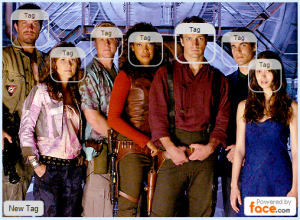Facial recognition is a complex and controversial tool that can now be yours for the low, low price of free.
Face.com is an Israeli startup founded in 2008 that provides websites and mobile apps with code to implement face detection or recognition. The code has been used more than 35,000 times since the company released it into the wild in May 2010, and Face.com’s tools have recognized or detected 35 billion faces.
You can find Face.com’s technology running on hundreds of sites and apps, ranging from fun toys like CelebrityFindr, which scours Facebook and Twitter for photos of celebrities, to practical tools like Fareclock, which tracks when employees punch in and out by scanning their faces. The company keeps a running tab on its blog about who’s using its technology.
The code is given out for free and can be used without payment so long as the site or app comes in under a certain number of daily uses. The company doesn’t disclose the exact number, but CEO Gil Hirsch said he made that threshold purposefully very high to make the technology accessible to the masses.
Only “tens” of customers are paying Face.com for the service, Hirsch said, and those paying sites and apps are doing recognition on millions of photos each day. Still, from just those handful of paying customers, Hirsch the company is taking in “good money.”
Like most startups in their early stages, Face.com is more focused on scale than sales. It wants to fine-turn its technology and make it ubiquitous.
Related Stories:
Video Pre-Rolls Are Given Interactive Makeover With Innovid
Speak Any Language With New Real-Time Voice Translation
To do that, Face.com’s team of 10 works with clients to tailor its software to each customer’s specific use cases.
For instance, Coca-Cola (KO, Fortune 500) worked with Face.com this year on its annual Summer Love festival in Israel to allow registered, opted-in participants to “like” the event on Facebook simply by going up to a kiosk that scanned their faces.
Face.com also recently worked with an eyeglasses merchant on a special implementation of its face detection technology. The company wanted customers to be able to see how different pairs of glasses would look on their faces, and it so happened that Face.com was working on a technology that would allow clients to do that. Face.com quickly finalized the code and brought it to market faster than it had planned.
Sign up for our free weekly newsletter
Subscribe“We’re in this space to remove friction,” Hirsch said.
Face.com got started on that premise. Hirsch hated how arduous the process of manually tagging friends in Facebook was, and he and three friends worked on a solution that eventually became Photo Tagger, a Facebook application that debuted in July 2009.
Photo Tagger finds friends’ faces in photos and automatically suggests nametags for them — a solution that Facebook adopted in its Photo Tag Suggest feature in late 2010. Face.com declined to comment on reports that its technology powers Facebook’s feature.
After the release of Photo Tagger, demand for Face.com’s technology skyrocketed. The company realized it was sitting on something big, and it decided to open up its service.
But putting face recognition tools into the hands of the public potentially means giving that technology to bad actors.
Hirsch said the company has a key safeguard in place: Face.com built its technology so that it can’t scan faces across the entire Internet. It can only find faces that are connected within a closed network, such as a Facebook friends list, a dating site, or an office network. That means someone you don’t know or haven’t given permission to view your photo can’t use Face.com’s recognition software to identify your face.
If a company were to use the technology maliciously, Hirsch said Face.com can just flip a switch and shut that site down — a last resort that the company has only used once.
“We’re an anti-stalking company,” Hirsch said. “The bad use cases of this, to us, are a nightmare.”
…
To continue reading this article, click here.
Via CNN MONEY
Photo courtesy of face.com
Related posts

Editors’ & Readers’ Choice: 10 Favorite NoCamels Articles

Forward Facing: What Does The Future Hold For Israeli High-Tech?

Impact Innovation: Israeli Startups That Could Shape Our Future





Facebook comments